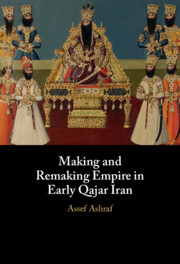Book contents
- Making and Remaking Empire in Early Qajar Iran
- Making and Remaking Empire in Early Qajar Iran
- Copyright page
- Contents
- Figures, Maps, and Table
- Acknowledgments
- Note on Transliteration and Terms
- Chronology of Key Dates
- Part I Frameworks
- Part II Centers
- Part III Peripheries
- 5 Petitions, Firmans, and Correspondence
- 6 Provincial Diplomacy and Entangled Authority
- 7 Tribal Relations and the Limits of Qajar Authority
- Conclusion
- Bibliography
- Index
5 - Petitions, Firmans, and Correspondence
from Part III - Peripheries
Published online by Cambridge University Press: 24 October 2024
- Making and Remaking Empire in Early Qajar Iran
- Making and Remaking Empire in Early Qajar Iran
- Copyright page
- Contents
- Figures, Maps, and Table
- Acknowledgments
- Note on Transliteration and Terms
- Chronology of Key Dates
- Part I Frameworks
- Part II Centers
- Part III Peripheries
- 5 Petitions, Firmans, and Correspondence
- 6 Provincial Diplomacy and Entangled Authority
- 7 Tribal Relations and the Limits of Qajar Authority
- Conclusion
- Bibliography
- Index
Summary
Chapter 5 explores the use of political correspondence (mursalāt), in the form of petitions and firmans, during the early Qajar period. Like marriage, political correspondence had a long history in Iran, but a manuscript collection of correspondence between Qajar rulers and Kangarlu tribal khans in the Caucasus helps us see how and why the use of correspondence changed during the early nineteenth century. The manuscript collection from the Majlis Library contains correspondence dating to the eighteenth century and up to 1828, with the numbers of petitions and firmans increasing dramatically during the Russo-Persian Wars (1804–13 and 1826–28). The collection suggests that correspondence was critical to Qajar efforts to protect the ‘Guarded Domains of Iran,’ that Qajar rulers in Tehran and Tabriz were well-informed of events on the war’s front, and that local circumstances and conditions in the Caucasus influenced political decisions.
- Type
- Chapter
- Information
- Making and Remaking Empire in Early Qajar Iran , pp. 185 - 223Publisher: Cambridge University PressPrint publication year: 2024

